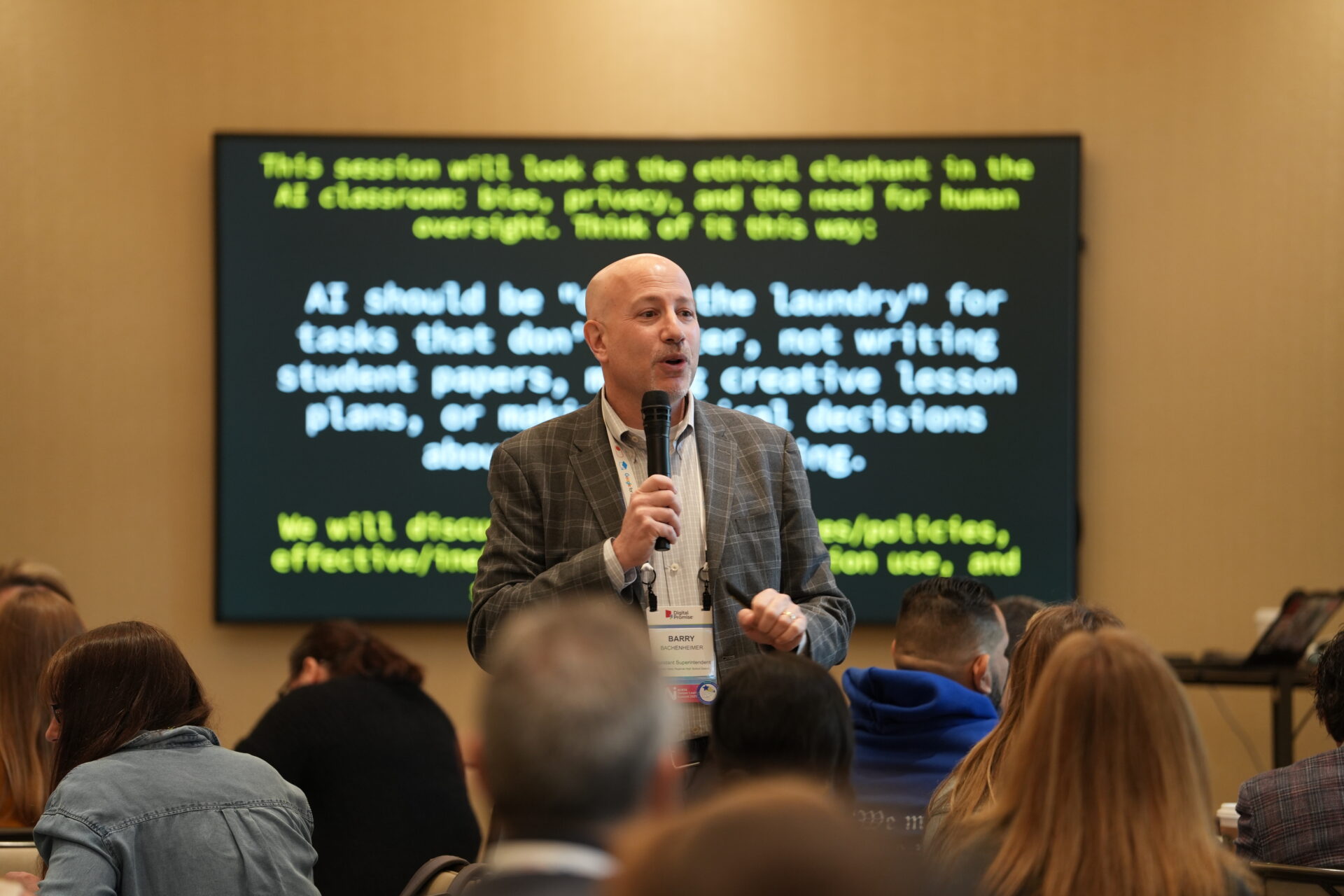
The second iteration of the summit successfully brought together 725 educators, administrators, technology leaders, and students to explore the intersection of AI and K-12 education. Conceived and first organized in 2024, this summit organically emerged from a desire to create a space to explore AI in education from the lens of educators and students.
Led by Digital Promise in collaboration with the Anaheim Union High School District, aiEdu, and the University of California, Irvine, represented by Professor June Ahn, the summit ensured that the bulk of the programming featured educators and centered student voice. As one student participant shared at the summit, “Conversations about AI in education shouldn’t just include students; they should start with students.”
Digital Promise team members presented on a variety of AI-related topics during the summit. Below, a handful of team members share reflections and key takeaways from their sessions that educators can apply to their own work and classrooms.
Reflections from Chaula Gupta, Vice President and Chief Program Officer
A key trend or theme from my session is…
As a district you don’t need an AI strategy, you need to determine—collectively with your community—the problems you want to solve, establish a transformative vision of what you want to be true, and determine if and where AI can be part of the solution.
The main applications for educators from my session are…
Start with guardrails so that educators and students have freedom to explore AI, but also know what restrictions exist; leverage an intentional, strategic, and pervasive approach to AI as a district by bringing everyone along, including by creating advisories of parents, students, educators; and take an interactive design approach to AI and empower and equip everyone to keep learning and improving.
One specific next step that educators can take based on my session is…
To require every edtech vendor, especially those that use AI, to provide a “nutritional information” sheet about their product that details what it does, what it collects, what risks it poses, and more.

The 2025 AI K12 Deeper Learning Summit brought together hundreds of educators and education leaders for two days of hands-on learning around tangible ways to leverage AI in classrooms.
Reflections from Yenda Prado, Research Analyst
A key theme from my session is…
Generative AI has the potential to support English learners’ strengths in reading through its ability to use a learner’s unique reading data to create customized reading intervention plans that meet individual learners’ needs.
The main applications for educators from my session are…
Kick start—or continue—discussions around the potential uses of AI-enabled learning technologies to support reading, and consider participation in the U-GAIN Reading National Leadership initiative, a research and development hub dedicated to exploring how teachers can effectively use generative AI to enhance elementary reading instruction in grades 1-3.
One specific next step that educators can take based on my session is…
Explore the U-GAIN Reading National Leadership initiative, or encourage your district to sign on as a district research partner by emailing me to learn more: yprado@digitalpromise.org.
Reflections from Ximena Dominguez, Co-Executive Director of Learning Sciences and Early Learning Research, and Stefani Pautz Stephenson, Senior Director, Educator Community Partnerships
A key trend or theme from my session is…
Frequently raised concerns around AI, such as data privacy and bias, are magnified when it comes to our youngest learners. Fortunately, edtech companies at the forefront of the discussion are working closely with educators and researchers trying to ensure emerging edtech tools are thoughtfully designed to help young learners and mitigate potential risks.
The main applications for educators from my session are…
When evaluating edtech tools, look for companies who center children’s well-being in their design process, with guidance from frameworks such as the Responsible Innovation in Technology for Children (RITEC) Design Toolkit, shared by the Joan Cooney Research Center, and the playful learning principles, shared by the LEGO Foundation. If you want to explore emerging innovations, keep an eye out for the “Kibeam Wand,” an innovative tool that leverages technology to support engagement with books and reading, and the AI companion that the team behind Scratch is working on to integrate as a way to provide learners agency when deciding what support they need.
One specific next step that educators can take based on my session is…
Join an upcoming discussion on the challenges and opportunities for leveraging AI with young learners. Email Nick Schiner to receive an invitation: nschiner@digitalpromise.org.

Speakers with deep expertise in AI for education presented on a variety of practical topics to help educators explore how to maximize AI use right away.
Reflections from Kelly McNeil, Learning Experience Designer; Nick Schiner, Director, Peer-to-Peer Professional Learning; and Amanda Wortman, Research and Evaluation Manager, Educator Community Partnerships
A key trend or theme from my session is…
Joining a community of others who are learning about and using AI in education is the best way to stay updated on trends and to ensure you are hearing diverse perspectives on its use.
The main applications for educators from my session are…
Connect with others! Find people using AI in diverse ways and who have different thoughts on its place in education.
One specific next step that educators can take based on my session is…
To join our AI Education Exchange community, powered by Digital Promise and HP. You can find us on LinkedIn, Facebook, and Discord!
Reflections from Nicole W. Adell, Associate Director, School Impact, Lucara Stewart, Associate Director, Learning Design, and Tera Phipps, Katelyn Schoenhofer, and Erica Slobodnik
A key trend or theme from my session is…
The importance of providing practical guidance for both educators and students to help them use AI ethically and thoughtfully.
The main applications for educators from my session are…
Develop district-wide AI policies that are human-centered, institute ongoing professional development to ensure educators are staying up-to-date on emerging AI trends and applications, and be transparent and model ethical AI use with students.
One specific next step that educators can take based on my session is…
To participate in professional learning sessions focused on the ethical use of AI to gain a deeper understanding of how to integrate AI tools responsibly in the classroom and foster critical thinking among students.

The goal of the summit was to help educators and education leaders navigate the plethora of AI information and implement effective practices in their own classrooms.
Reflections from Barbara Pape, Senior Director, Learner Variability Project
A key trend or theme from my session is…
Weaving the robust and research-based Learner Variability Navigator (LVN), built on a whole child framework, into an AI platform, Yourway Learning, can facilitate personalizing learning for all students and provide teachers with a quick way to write lesson plans based on research.
The main applications for educators from my session are…
Use LVN Yourway to create lesson plans that are personalized and include all students, including those with learning differences.
One specific next step that educators can take based on my session is…
To try out LVN Yourway and complete our survey to let us know what works, what doesn’t, and what you would like to see as we move forward with launching LVN Yourway.